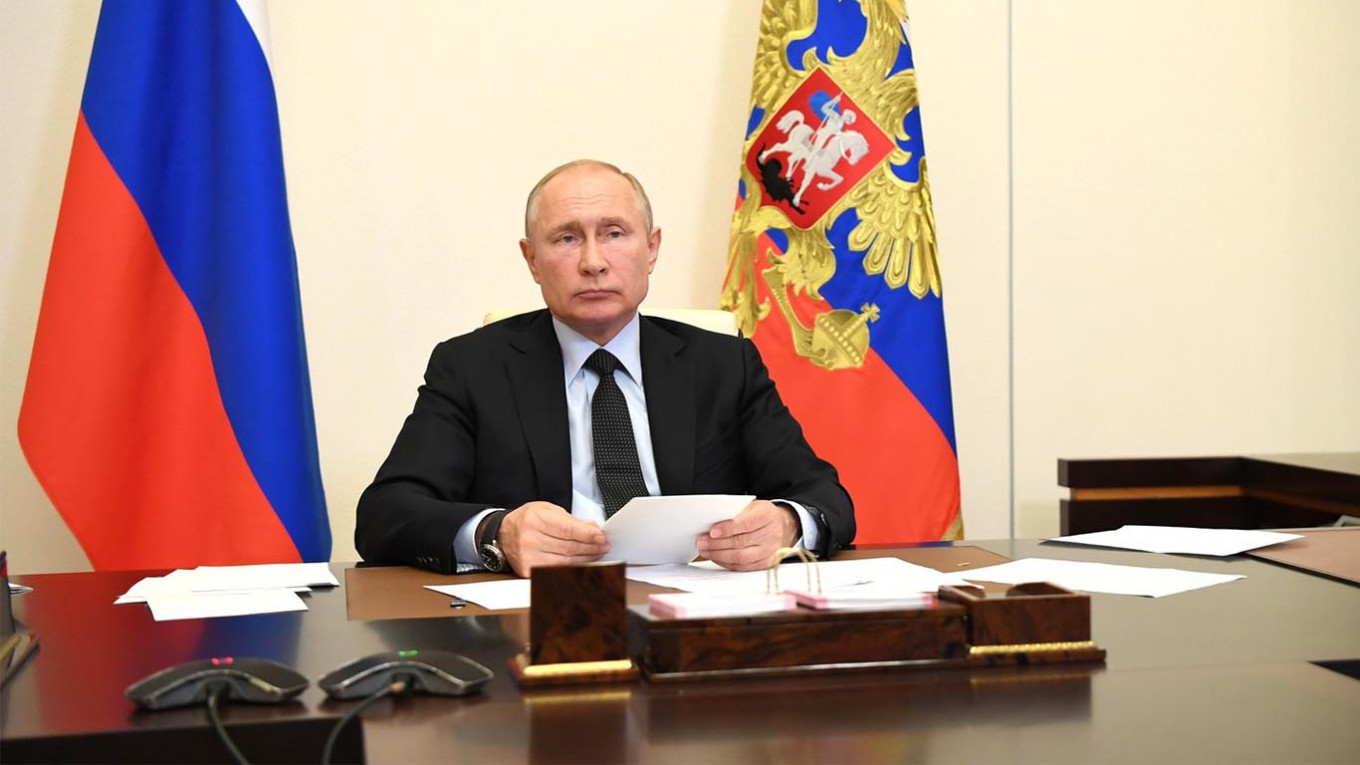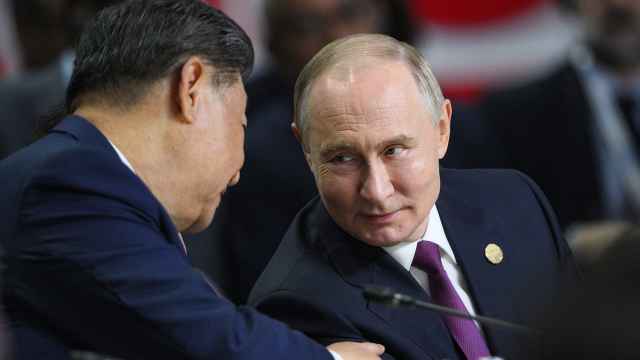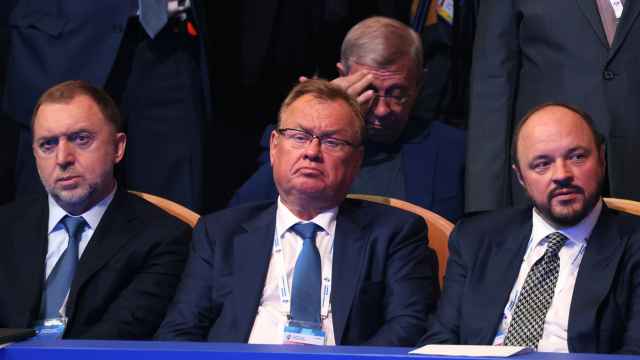Russian public opinion is bucking the trend. While the approval ratings of most Western leaders have risen amid the new coronavirus pandemic, President Vladimir Putin’s ratings are consistently falling, taking some governmental institutions down with them. Data collated by the independent Levada Center pollster reveal that the president’s approval ratings slumped to a historical low of 59% in April, and stayed there in May. This may be a new plateau.
These are the two first approval ratings that the Levada Center has calculated via telephone rather than face-to-face interviews between sociologists and respondents, because of the pandemic. Yet this hardly looks any better for Putin. Usually, those polled tend to express more loyalty to the state over the telephone. It’s an old Soviet reflex: you never know who’s listening.
Since 2017, the authorities’ approval ratings have depended less and less on symbolic greatness and a multitude of victories over enemies at home and abroad. The state of the economy and social well-being have eclipsed national pride, and the effect of Russia’s 2014 annexation of Crimea — which initially sent Putin’s ratings soaring to over 80% — has worn off and lost its potential to mobilize.
The fact is that symbolic greatness won’t feed hungry stomachs. The post-Crimea stagnation in economic growth and real incomes has clearly started to influence the attitudes of ordinary Russians to the state.
Appetite for change was satisfied at the start of 2020 by a change in government and proposed amendments to the constitution, including resetting the clock on presidential terms, allowing Putin to run yet again in 2024 (and even 2030). Next, two mobilizing events—the vote on changing the constitution scheduled for April and the bombastic celebration of the seventy-fifth Victory Day in May—were supposed to force the crumbling pro-regime majority to forget for a while about their low incomes and stagnating GDP.
The pandemic completely changed the agenda. Putin has suddenly found himself in a role that is less conductor of a political orchestra, and more moderator of a medical conference with elements of accountancy for allocating funds, which when checked turned out to be completely insignificant. The president’s altered image is far from convincing to the public, and is the first reason for his falling ratings.
The change in agenda and disappearance of tools for political mobilization have combined with a sharp decline in the economy and decreased budget revenues as a result of low oil prices, plus the shuttering of businesses due to the lockdown. This has all been exacerbated by the government’s sluggish reaction to the crisis.
The pandemic has damaged the economy far faster than typical economic and financial crises. Unhappiness and confusion have gathered pace like a hurricane, caused by the loss of economic indicators and uncertainty over sources of income and the situation on the labor market.
At the center of this hurricane is Putin. Just as before his position as autocrat meant he took credit for everything good in the eyes of most people, from economic growth to the annexation of Crimea, now he is forced to take on everything bad and all the unhappiness resulting from the pandemic and economic crisis, and this is the second reason for the slump in his ratings.
The autocratic personalized model, in which the ruler is a more important figure than a standard president or prime minister in a Western democracy, has worked out badly for the living symbol of Russian power. Putin’s ratings have fallen, even as those of Western leaders have increased.
The scale of help available to Russians, both as a proportion of GDP and in absolute terms, is incomparable to the support available to the public and businesses in other countries around the world. Nor were Russian measures unrolled particularly swiftly or effectively. Businesses have complained that instead of direct support, they have been encumbered by future taxes and loans: costs have been postponed, but not waived.
It seems that Putin has lost the support of the private business class, which makes up 20–25% of the labor market, and impoverished workers are unhappy too. The state is used to dealing with disaffected educated urbanites, but the working class, which has always been a pillar of the regime through its expectations of paternalistic support from the state, is another matter. But that help has not been forthcoming, and locking entire social groups into this trap of neither working nor receiving state support is the third reason for the fall in ratings.
Finally, Putin’s self-isolation is apparently being judged not as responsible behavior, but as political self-isolation from society, and that is the fourth reason for his ratings problem. As is often the case, Putin has dragged down the ratings of other parts of the power structure with him: the approval rating of regional heads fell from 65% in March to 61% in April.
Relaunching the search for political enemies at home and abroad and returning to the mobilization scenario — voting to change the constitution and holding the postponed Victory Day parade — are now possible: Moscow Mayor Sergei Sobyanin was forced to drastically ease the lockdown rules to accommodate Putin’s haste to hold the vote on June 24, followed by the parade on July 1. Putin is keen to do this before his ratings decrease even further, and while his exit from the pandemic can be assessed as a “victory.”
The hope that these two events may have a mobilizing effect remains. But there is no guarantee of success. Most Russians will automatically vote for the constitutional amendments and resetting the clock on presidential terms, but the various social groups that are already feeling despondent could be irritated further. All of this creates an environment for the Kremlin, at least for the second half of this year, that is distinctly less comfortable and marked by conflict.
This article was first published by the Carnegie Moscow Center.
A Message from The Moscow Times:
Dear readers,
We are facing unprecedented challenges. Russia's Prosecutor General's Office has designated The Moscow Times as an "undesirable" organization, criminalizing our work and putting our staff at risk of prosecution. This follows our earlier unjust labeling as a "foreign agent."
These actions are direct attempts to silence independent journalism in Russia. The authorities claim our work "discredits the decisions of the Russian leadership." We see things differently: we strive to provide accurate, unbiased reporting on Russia.
We, the journalists of The Moscow Times, refuse to be silenced. But to continue our work, we need your help.
Your support, no matter how small, makes a world of difference. If you can, please support us monthly starting from just $2. It's quick to set up, and every contribution makes a significant impact.
By supporting The Moscow Times, you're defending open, independent journalism in the face of repression. Thank you for standing with us.
Remind me later.








